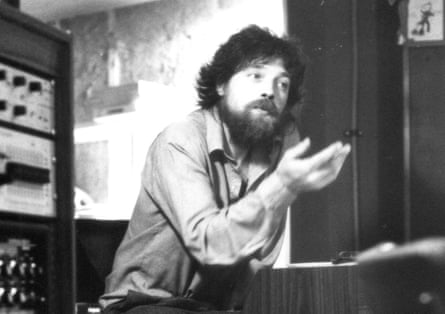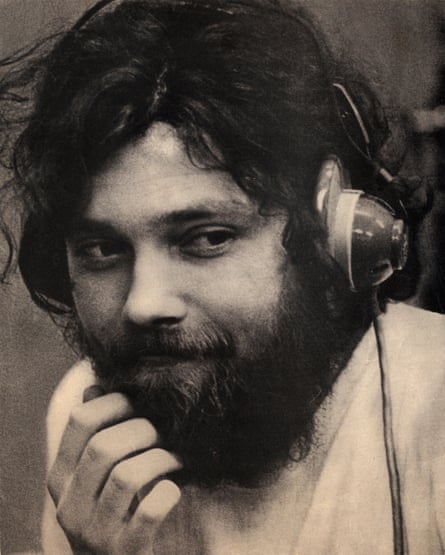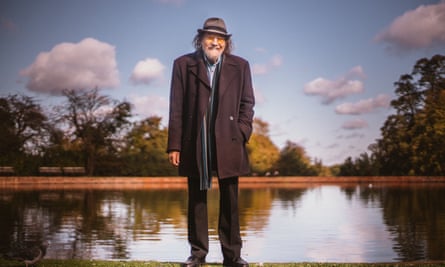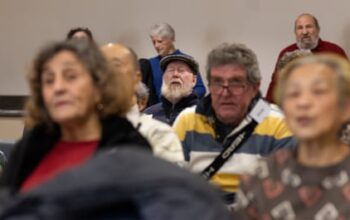Bill Fay explains that since he was 15, he has been alone with a piano in the corner of a room. He also mentions that he is not someone who likes to be in the spotlight.
This statement is an understatement. The mysterious octogenarian has been in the music industry since 1967, but there is only one recorded live performance of Fay available online – a single song featured on Later… With Jools Holland. He has no desire to be in the spotlight as a public figure. “I make music solely for the love of it,” he explains.
Fay has selected a Toby Carvery as the location for our chat, an improvement from the car park he chose for his brief appearance on Radio 4’s Today programme back in 2012. As soon as he arrives, he stands out among the other diners. He is dressed in a suit, sporting round glasses with yellow lenses and a trilby. His greying hair, which matches his beard, falls in loose curls from under his hat. He is accompanied by a helper and appears to be in fragile health. He mentions that his Parkinson’s disease has progressed significantly. Interviews have always been uncommon for him and he informs me that this will likely be his last one.
Our discussion was sparked by the launch of Tomorrow Tomorrow and Tomorrow, a musical collection created by the Bill Fay Group (featuring Bill Stratton, Rauf Galip, and Gary Smith) in the late 1970s but was never made available to the public. It remained unknown for many years until David Tibet of Current 93 released it in 2005, and it is now being released on vinyl for the very first time. Combining elements of art rock, folk, and jazz, this album weaves together melancholic ballads with experimental elements, all while showcasing Fay’s tender vocals.
Fay, a native of north London, has lived in the area for his entire life. He spent his childhood close to our current location and would often play the piano at home. While attending college in Wales, he discovered a passion for songwriting and started recording his own music. His demo tapes caught the attention of Terry Noon, a former member of Van Morrison’s band Them, who assisted him in securing a record contract.
His 1970 self-titled debut was a lush collection of bucolic folk pop that later drew comparisons to Nick Drake. Fay’s second album, 1971’s Time of the Last Persecution, is a masterwork of tormented introspection on which he grapples with his religious faith and tries to find optimism amid impending Armageddon.

It would eventually gain a following, including Wilco’s Jeff Tweedy. Tweedy comments, “The music really spoke to me. It has a straightforward and refined quality. You can easily tell that it was not driven by ambition or trends; it was simply someone humbly adding their voice to bring some beauty and perhaps find peace in the world.” Despite this, the record did not do well commercially and Fay did not release any new music for many years.
Fay refers to these years as his “deleted” years, when he was no longer actively involved in the music industry. He states that it wasn’t his choice to leave, but he holds no bitterness towards the industry. He explains that although it was not easy, he still had his music and was able to discover new songs, which was satisfying enough for him.
Fay perceives the songwriting process as something beyond his power. He describes himself as a discoverer rather than a professional musician. The piano played a crucial role in his upbringing, gradually teaching him how to play. He relies on his ability to feel the music, which then sparks the creation of lyrics that are not written down but rather flow naturally. He views this experience as a mysterious and spontaneous occurrence.
During the time he was not involved in the music industry, Fay held various jobs such as a groundskeeper, fruit picker, factory worker, and fishmonger. Despite this, he continued to create music using a simple home recording setup, never expecting it to gain recognition. One day in 1998, while working in his garden, he listened to some of his unfinished songs on his Walkman. He was surprised by how good they sounded and thought to himself that maybe one day someone would hear them. Coincidentally, that same day he received a call informing him that his first two albums were going to be reissued.

Display the image in full screen.
Fay’s impact had unknowingly extended beyond himself. Renowned musicians like Jim O’Rourke became devoted admirers. After much convincing, Tweedy successfully convinced Fay to perform with Wilco in 2007, covering his song “Be Not So Fearful”. Tweedy fondly recalls it as “one of the most beautiful nights of my life”. Around the same time, Fay’s music was being covered by Marc Almond and Nick Cave even invited him to join Grinderman on tour, praising him as “one of the greats”. However, Fay respectfully declined this invitation.
Joshua Henry, a young musician and producer, stumbled upon Fay’s music in his father’s record collection. They formed a strong connection over it while Henry’s father was battling cancer. Henry made a promise to himself to find Fay and collaborate on a record with him. However, Fay was difficult to reach and surrounded by unconventional individuals. After numerous attempts, they finally communicated and quickly hit it off. Henry was blown away by the quality of Fay’s music when he received his first songs. He compares the experience of recording with Fay to being in the presence of John Lennon.
The result was 2012’s acclaimed Life Is People, 2015’s Who is the Sender? and 2020’s Countless Branches. A new generation of fans followed, with compliments and cover versions streaming in, including from the War on Drugs, Kevin Morby, Julia Jacklin, Cate Le Bon and Mary Lattimore.
Fay humbly acknowledges the impact his music has on other songwriters. He finds it touching, but also finds it difficult to fully comprehend. While he is in the process of writing a song, he is affected by it, but he does not consider the potential impact on others. Once he finishes a song and is satisfied with it, he moves on to the next one without dwelling on it. He does not spend time reflecting on the influence of his music.
He opens a package of nicotine lozenges and discusses his early life. “Certain images remain ingrained in your memory,” he explains. “Hiroshima; African Americans being lynched. The young girl with severe burns on her back in Vietnam. As a youth, being aware of these events and growing up in that time period had a profound effect on me.”
Fay, viewing the world with weariness but through a Christian perspective, delved into the extreme highs and lows of life, the beauty and suffering of existence on this earth. He describes himself as a seeker, a common theme during that time period. In his first album, he focused on the wonders of the world while sitting in his garden and was struck by the intensity of a passing bee, which he then compared to the vast expanse of the universe. In his next album, he delved even deeper into this intense darkness. He describes it as a weighty record, filled with apocalyptic music fitting for the current state of the world.

Display the picture in full screen mode.
Is he still finding it difficult to remain optimistic in the face of the tumultuous events happening in the world? “That’s a profound question,” he responds, followed by a moment of silence. “There is always good and bad, but having faith is crucial.” Are we talking about religious faith? “Yes,” he confirms. “I struggled with it a bit [in my youth] because it felt limiting, but I eventually came to believe in Jesus and study prophecy. I had a sense that there would be divine intervention.” Does he still believe this? “It can’t continue like this indefinitely…there has to be a resolution.”
Although he still carries the emotional burden of the same topics that inspired his music over half a century ago, Fay has ceased to create songs about them or anything else. Due to his Parkinson’s disease, he has not played the piano in three years. However, he has numerous unfinished songs recorded and only a small portion of his work has been released to the public.
Does he take pride in his music? “I can’t say I feel proud,” he responds, the word barely escaping his lips. “I am simply grateful.” He extends both hands and gently clasps mine in a warm handshake before slowly rising to return to his element: the corner of the room.
Source: theguardian.com


